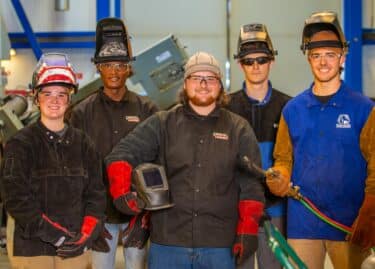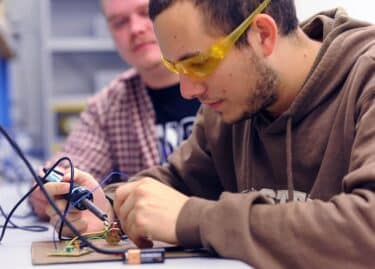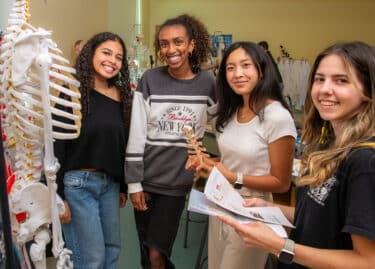Turning Tragedy Into Purpose
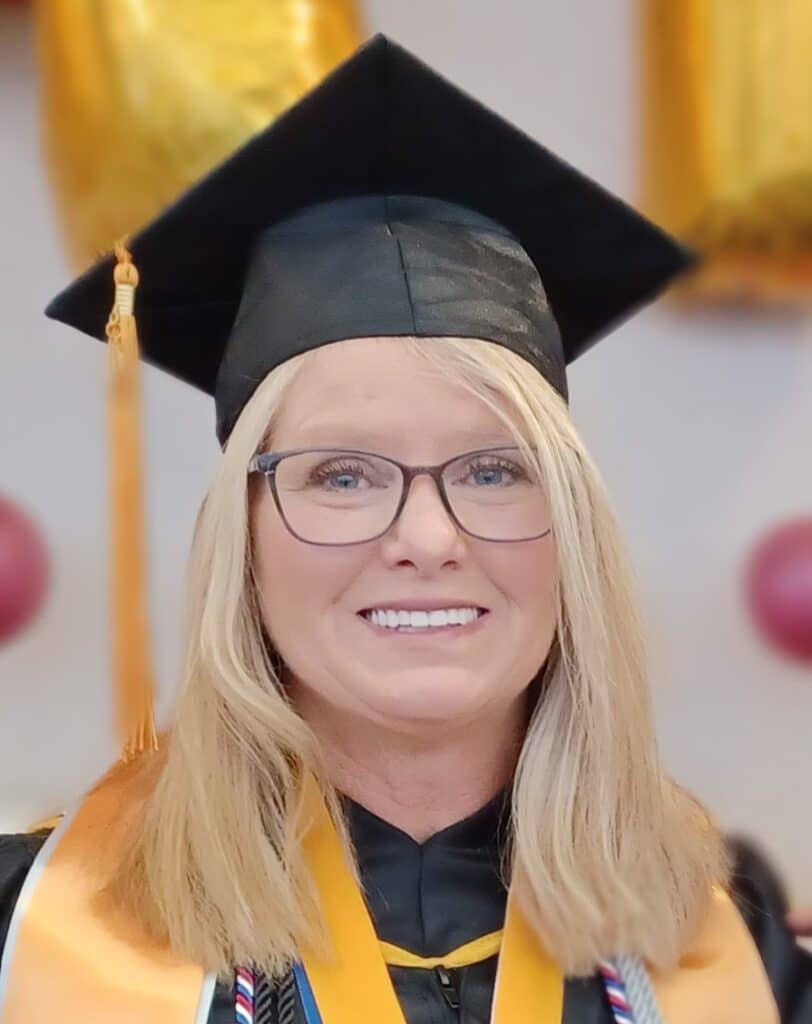
When Kelly Pilotte was nominated to apply for a position on the Community College System of New Hampshire board of trustees as a student trustee, she saw it as an opportunity to deepen her impact as she pursued a goal with profoundly personal roots. As a trustee, she championed the student perspective while focusing on the needs of those battling trauma and substance misuse. As a student, she continues to build toward the dream of helping others in honor of the memory of her cherished son Michael who lost his battle in 2018.
Kelly’s life experience had its own challenges and decision points. Growing up, Kelly was taught that her future could follow one of two possible paths: obtain scholarships to make college affordable or join the military. While she initially considered enrolling at an in-state four-year university, Kelly soon realized that without a clear career plan she would be spending time and scarce money on courses she might never use.
“I was excited to enroll in Chinese language courses, but then thought, ‘What am I doing?’ when I recalled my high school years struggling with Spanish. I didn’t want to waste my money taking classes just for the sake of taking classes, so I chose to enlist in the Marines.”
It was during this period of her life that Kelly’s son, Michael, was born. Faced with a choice of furthering her military career or pursuing an occupation that would enable her to stay closer to home, she opted for the latter and joined the United States Postal Service (USPS). For the next several decades, Kelly enjoyed her tenure with the USPS, occasionally wondering what might come next in her career while she proudly watched her son grow up to become a Marine himself, ultimately rising to the rank of Sergeant.
In 2018, however, Kelly’s life took a tragic turn. After years of struggling with PTSD and related substance misuse, Michael succumbed to his illness and passed away from a fatal overdose. In the latter years of his life, while in and out of treatment, Michael would express frustration with what he saw as an ineffective treatment approach that only resulted in a cyclical pattern of sobriety and relapse. After Michael’s death, Kelly’s purpose in life completely shifted to a desire to provide direct support and advocacy for those suffering as her son had. Even more, as a testament of love to Michael, Kelly aspired to form a foundation in his name that would realize his vision for an effective approach to treatment that addresses the root causes of substance misuse.
Although empowered by her strong conviction, Kelly realized she lacked the knowledge and expertise she would need to create and operate a foundation of her own. This served as the catalyst for pursuing licensure as a Licensed Alcohol and Drug Counselor (LADC) along with courses that would give her the skills to form and run a non-profit organization. When researching available programs in New Hampshire, Kelly learned that NHTI-Concord’s Community College offered an Addiction Counseling associate degree.
“I wanted a program that I could complete in two or three years instead of four – I’m 55, and at this point in my life, I don’t feel that I have the luxury of time when it comes to shifting to an entirely new direction in my career. NHTI had the program I needed in a setting where I could feel comfortable participating.”
Kelly was initially apprehensive about returning to school after so many years. She soon found that NHTI’s small classes and ease of access to instructors made for an ideal and empowering learning environment. The intimacy of NHTI enabled Kelly to not only succeed but excel in her coursework and earn admission to the international honors society Phi Theta Kappa, of which she is also the NHTI chapter president and vice president of leadership for the New England region. This drive also resulted in Kelly competing to serve as a student trustee on the Community College System of New Hampshire’s governing board, where she was able to use the opportunity to contribute to the ongoing stewardship of the college system and to the discourse of how to further improve the community college experience for students of all ages and backgrounds.
In reflecting on her time at NHTI, the transformative experience is apparent:
“At first, I could barely turn on a computer, but by the end, I was taking classes entirely online. I couldn’t do public speaking; now, I do it all the time. Professor Michael O’Bryant, department chair for addiction counseling and human services, and Trisha Dionne, the director of online learning and Phi Theta Kappa advisor, are two of the reasons why I am continuing at NHTI – I would not be the person I am today without their help. I feel that I could not make the same kind of connection in a larger school. The smaller community college helps to make things more personal, and I feel that this is a big reason why I have been able to become the leader I am today.”
Today, the knowledge and skills Kelly has acquired as a student at NHTI have prepared her to launch a new career. Two important personal steps for her are establishing The Michael Stephen Boyd Memorial Foundation and the Sgt. Michael Stephen Boyd Scholarship Fund in her son’s memory. The latter fund, held at the Foundation for NH Community Colleges, will provide financial support to NHTI students enrolled in the Addiction Counseling program. Kelly is motivated by keeping her son’s memory and legacy alive and empowering people to help others suffering from addiction.
New Hampshire and its residents will surely benefit from Kelly’s passion and dedication to helping those in need and her desire to make a lasting difference.
Community members who are interested in supporting the Sgt. Michael Stephen Boyd
Scholarship Fund at NHTI can donate on-line at https://givenhcc.org/where-to-give/nhti/ or contact Kelly directly with any questions at [email protected].
A Passion for Helping Others
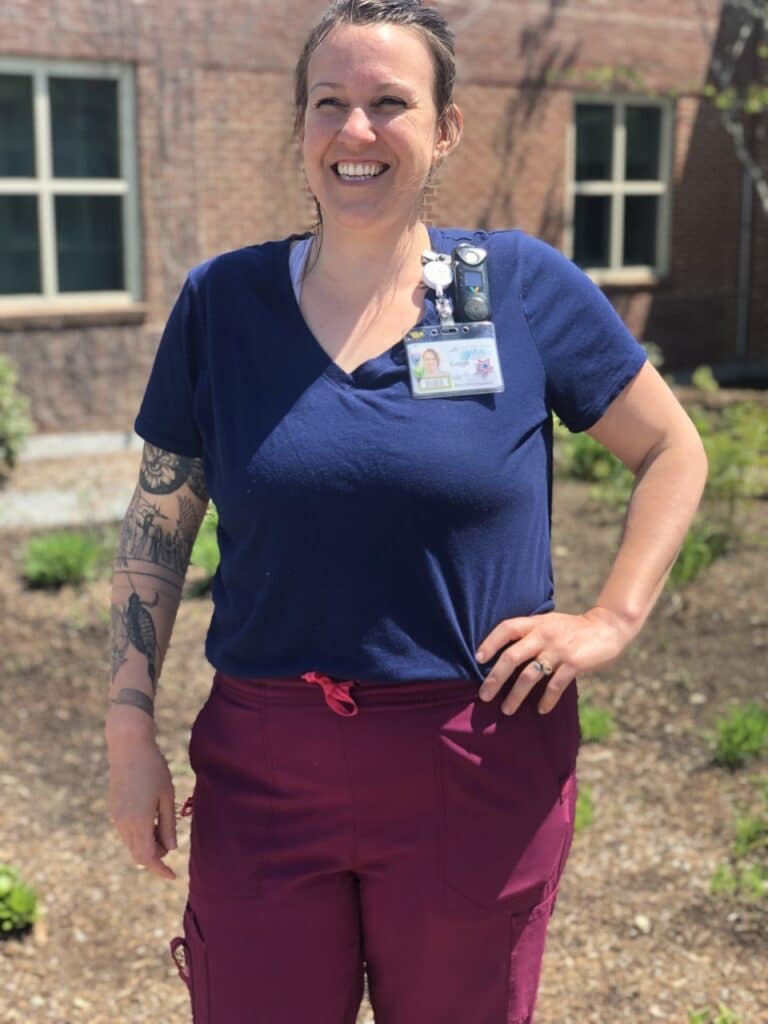
Loretta Blackwell’s journey to becoming a Registered Nurse in Manchester, New Hampshire took several turns along the way, each serving as a building block for a career as a caregiver who makes a difference in the lives of others.
As an equestrian who grew up riding in rural Bradford, New Hampshire, Loretta was no stranger to hard work and the positive experiences they can yield.
“I had my own horse” explained Loretta. “I was pretty lucky. My parents made me work really hard for that, so I always had a sense of accountability and responsibility. I had to balance school life and farm life responsibilities. That really shaped who I was back then and who I am now.”
It was during this period that Loretta began to explore career options after high school, deciding in her senior year to pursue teaching or art therapy. The decision was partially rooted in her high school experience when she struggled to feel confident about her abilities in science and math. She continued to gravitate towards art, and ultimately completed a bachelor’s degree in fine art in 2012.
After graduating with her BFA in 2012, Loretta moved from Boston to Worcester, MA and spent the next five years working as a therapeutic arts educator at a non-profit organization.
It was in 2017 that Loretta and her now-husband returned to New Hampshire to assist her mother on the family homestead. The pair moved in with Loretta’s mother while continuing to work in their respective fields, but soon found that their education and previous work experience left them with minimal career options locally. At that same time, Loretta’s experience supporting her mother made her realize she had a passion and a talent for caregiving. Having spent several years teaching and working with adults with developmental or intellectual disabilities, she found that her true calling was taking care of people and helping them transition from hardship in various forms.
“It was really hard for us to get competitive jobs in our respective fields, and I planned to go back to school at some point. The other component was my mom – she’s disabled, and her care provider situation was not working out, so my husband and I helped out and learned a lot by living with her. I learned that if I could help my mom in that capacity, I could probably help other people too. My husband also changed careers at that point, which served as a catalyzing force and inspiration for me beginning such a transformative change in my professional life.”
Loretta spoke with a friend in the field and was encouraged to consider a future in nursing. With both of her parents and an uncle having attended River Valley Community College (RVCC) for healthcare-related professions, she knew that she wanted to attend one of New Hampshire’s community colleges. It was a personal acceptance letter from the chair of the nursing program at RVCC that made an impact on Loretta and led to her decision to attend RVCC.
The personal approach that drew Loretta to the college did not end with the offer of admission. Instructors in the nursing program mentored students like Loretta, helping her break down complex concepts in a way and at a pace that worked for her. Loretta’s instructors saw more in her, including an ability to contribute well beyond her academic pursuits. Mid-way through the program, Loretta’s mentor at RVCC nominated her to the Community College System of New Hampshire board of trustees as a student trustee.
As a board member who also sat on the Student Success Committee, Loretta was able share her perspective as a student and bring forth the concerns of fellow learners before voting on decisions that would affect the system’s policies and strategic direction. The experience helped Loretta understand what it meant to be a leader not just in the classroom, but in the broader world around her. One way Loretta exercised her budding confidence in leadership was by soliciting the input of fellow students in the nursing program, and meeting with their clinical instructor to advocate for changes in the delivery of instruction to better suit students’ varying learning styles. The resulting changes yielded a positive experience for her classmates that was backed up by a notable improvement in the students’ learning outcomes.
Having graduated from the nursing program in 2022, Loretta is taking her newfound confidence and skills out into the world as a Registered Nurse at Catholic Medical Center (CMC), working on a cardiovascular medical surgical telemetry floor and caring for patients who require continuous monitoring due to chronic heart conditions. Loretta is looking forward to the challenge of caring for more individuals in her role at CMC and a greater opportunity to make a positive difference in the lives of others.
“I chose this because CMC serves as the New England Heart & Vascular Institute, so it will really firm up my skills caring for people with chronic heart conditions. If I want to go into cardiology, it’s a great place to learn what that really means. Looking back on my experience up until now, my advice for those behind me is that we all need to be confident and not give up on the long path required to get here. Nursing school can leave you feeling overwhelmed, but it is crucial to remind yourself that you’ve been accepted into a very difficult program. It’s important to have mentors and it’s really important, even if it is just one person in your life, to have a support system to help you long the way.”

